July 30, 2024
In a July 25 Washington Post op-ed, OpenAI cofounder and CEO Sam Altman laid out the stakes for the global artificial intelligence landscape: a race between democratic and authoritarian visions — the United States vs. China and Russia. Altman argues that continued US leadership in AI development is crucial to ensure the technology benefits all Americans rather than become concentrated in the hands of authoritarian regimes.
Altman’s argument is not new, but his policy prescriptions are more detailed than before. In addition to the general undertone that Washington should trust the AI industry to regulate itself,the OpenAI chief calls for improved cybersecurity measures, investment in infrastructure, and new models for global AI governance. He wants additional security and funding for data centers, for instance, and says doing this will create jobs around the country. He also urges the use of additional export controls and foreign investment rules to keep the AI industry in US control, and outlines potentially global governance structures to oversee the development of AI.
We’ve heard Altman’s call for self-regulation and industry-friendly policies before — he has become something of a chief lobbyist for the AI industry over the past two years. His framing of AI development as a national security imperative echoes a familiar strategy used by emerging tech sectors to garner government support and funding.
Scott Bade, a senior geotechnology analyst at Eurasia Group, says Altman wants to “position the AI sector as a national champion. Every emerging tech sector is doing this:
‘We’re essential to the future of US power [and] competitiveness [and] innovation so therefore [the US government] should subsidize us.’”
Moreover, Altman’s op-ed has notable omissions. AI researcher Melanie Mitchell, a professor at the Santa Fe Institute,points out on X that there’s no mention of the negative effects on the climate, seeing that AI requires immense amounts of electricity. She also highlights a crucial irony in Altman’s insistence to safeguard intellectual property: “He’s worrying about hackers stealing AI training data from AI companies like OpenAI, not about AI companies like OpenAI stealing training data from the people who created it!”
The timing of Altman’s op-ed is also intriguing. It comes as the US political landscape is shifting, with the upcoming presidential election no longer seen as a sure win for Republicans. The race between Kamala Harris and Donald Trump is now considered a toss-up, according to the latest polling since Harris entered the race a week and a half ago. This changing dynamic may explain why Altman is putting forward more concrete policy proposals now rather than counting on a more laissez-faire approach to come into power in January.
Harris is both comfortable with taking on Silicon Valley and advocating for US AI policy on a global stage, as we wrote in last week’s edition. Altman will want to make sure his voice — perhaps the loudest industry voice — gets heard no matter who is elected in November.More For You
- YouTube
At the 62nd Munich Security Conference in Munich, GZERO’s Tony Maciulis spoke with Benedikt Franke, Vice Chairman and CEO of the Munich Security Conference, to discuss whether the post-1945 global order is under strain or already unraveling.
Most Popular
- YouTube
Zelensky agrees: elections matter #PUPPETREGIME
As more small businesses move sales, payments, and customer relationships online, they unlock new opportunities, but they also become easier targets for cyber-criminals and other threat actors.
TOKYO, JAPAN - FEBRUARY 8: Japan's Prime Minister Sanae Takaichi, leader of the ruling Liberal Democratic Party (LDP), places a red paper rose on the name of an elected candidate at the LDP headquarters on general election day on February 08, 2026 in Tokyo, Japan. Voters across the country headed to polls today as Japan's Lower House election was held.
Photo by Kim Kyung-Hoon - Pool/Getty Images
When Japanese Prime Minister Sanae Takaichi called snap elections last month, it was a big gamble. Holding a winter election just four months into her tenure with no real policy record to run on?
© 2025 GZERO Media. All Rights Reserved | A Eurasia Group media company.
